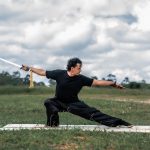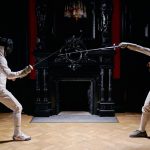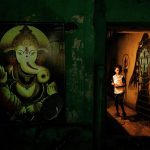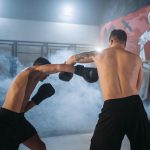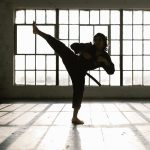Welcome to our expertly curated article showcasing the unparalleled brilliance of Jackie Chan's filmography.
As we embark on an insightful journey through the 15 best Jackie Chan movies of all time, we will explore the masterful blend of action and comedy that has cemented Chan's status as a legendary icon.
Delve into his remarkable martial arts prowess, innovative use of everyday objects as weapons, and his collaborations with esteemed actors and directors.
Get ready to be captivated by the cinematic brilliance of Jackie Chan's extraordinary career.
Key Takeaways
- Jackie Chan's movies showcase his unique blend of martial arts and comedy, with films like "Drunken Master" and "Police Story" highlighting his ability to interweave intense action with humor.
- Chan's exceptional martial arts prowess is demonstrated in films like "Police Story," where he engages in highly engaging fight scenes and stunts, showcasing his skills in kung fu and stunt coordination.
- Jackie Chan's action and stunts are a major highlight in movies like "Project A" and "Armour of God," where he expertly navigates through challenging settings and utilizes innovative props in fight scenes.
- Chan's ability to use everyday objects as weapons is showcased in films like "Rumble in the Bronx," where he turns ordinary items into effective combat tools, displaying his martial arts skills in unique settings.
Drunken Master (1978)
Drunken Master (1978) showcases Jackie Chan's unparalleled mastery of martial arts and comedic timing as he portrays Wong Fei-Hung, a young martial artist utilizing the unique Drunken Boxing technique. This film not only solidified Chan's status as a martial arts legend but also left a lasting impact on the world of martial arts cinema.
The influence of Jackie Chan's Drunken Boxing technique can be seen in modern martial arts, with its fluid and unpredictable movements, combining elements of agility, deception, and improvisation.
Additionally, the film marked the evolution of Jackie Chan's comedic style in his portrayal of Wong Fei-Hung. Chan seamlessly blends physical comedy with intense action, creating a character that is both humorous and formidable. His comedic timing and ability to incorporate humor into fight scenes have become hallmarks of his signature style, influencing generations of martial arts actors and comedians alike.
Police Story (1985)
One of Jackie Chan's most beloved films, Police Story (1985), is considered a classic in the action genre. This film had a significant impact on Jackie Chan's career and the action genre as a whole.
In Police Story, Chan showcased a remarkable evolution in his martial arts style compared to his earlier films. He not only displayed his exceptional physicality and stunt coordination but also incorporated a more realistic and gritty approach to his fight scenes. The action sequences in Police Story were intense and adrenaline-fueled, featuring intricate choreography and jaw-dropping stunts.
This marked a departure from his previous comedic martial arts films, solidifying Chan's reputation as an accomplished and versatile action star. Police Story set a new standard for action films and cemented Jackie Chan's status as a legendary performer in the genre.
Project A (1983)
Project A (1983) showcases Jackie Chan's impeccable timing and acrobatic prowess as he portrays Dragon Ma, a coast guard officer fighting piracy in 19th-century Hong Kong. This film not only solidified Chan's status as a martial arts superstar but also had a significant impact on the world of martial arts cinema.
Here is a choreography analysis and the influence of Project A on martial arts cinema:
- Complex Fight Sequences: Project A features intricately choreographed fight scenes that blend acrobatics, hand-to-hand combat, and prop usage. Chan's ability to seamlessly transition between different fighting styles and incorporate everyday objects as weapons is truly impressive.
- Innovative Stuntwork: The film showcases Chan's daring and inventive stuntwork, with him performing death-defying leaps and falls. His commitment to performing his own stunts elevated the level of realism and excitement in martial arts films.
- Influencing Future Filmmakers: Project A's success influenced a generation of filmmakers, inspiring them to incorporate Chan's unique blend of action and comedy in their own movies. Its influence can be seen in films like Rush Hour and Shanghai Noon.
- Elevating Martial Arts Cinema: Project A elevated the standards of martial arts cinema, setting a benchmark for high-quality action sequences and innovative fight choreography. It paved the way for future martial arts films, contributing to the genre's evolution and popularity worldwide.
Armour of God (1986)
Additionally, 'Armour of God (1986)' showcases Jackie Chan's versatility as an actor and his ability to seamlessly combine action, comedy, and adventure. In this film, Chan plays Asian Hawk, an ex-pop star turned treasure hunter. One of the key scenes in 'Armour of God' involves a combat with monks using a ladder, where Chan's innovative use of props in fight scenes is on full display. His mastery of Hapkido and weapon training is evident as he incorporates the ladder into his martial arts choreography.
When comparing Chan's martial arts skills in 'Armour of God' and 'The Legend of Drunken Master', we see a refinement of his techniques in the latter film. In 'The Legend of Drunken Master', Chan portrays Wong Fei-Hung and refines the art of Drunken Boxing. The final battle scene in 'The Legend of Drunken Master' showcases phenomenal choreography that took three months of filming to perfect. While both films highlight Chan's martial arts prowess, 'The Legend of Drunken Master' takes it to another level with its intricate fight sequences.
To further illustrate the analysis, the following table provides a visual representation of the comparison between the two films:
| Film | 'Armour of God' (1986) | 'The Legend of Drunken Master' (1994) |
|---|---|---|
| Martial Arts Skills | Innovative use of props in fight scenes | Refinement of Drunken Boxing techniques |
| Fight Choreography | Ladder combat | Phenomenal final battle scene |
| Training and Mastery | Hapkido and weapon training | Three months of filming for perfection |
Rumble in the Bronx (1995)
Ranked as the seventh best Jackie Chan movie of all time, 'Rumble in the Bronx (1995)' showcases Chan's exceptional martial arts skills and the ability to turn ordinary objects into effective weapons. This action-packed film not only highlights Chan's physicality and stunt work but also leaves a lasting cultural impact and representation.
Here are four key points about 'Rumble in the Bronx (1995)':
- Cultural impact and representation: 'Rumble in the Bronx' introduced Jackie Chan to Western audiences, making him a global action star. The film's setting in the Bronx, a predominantly African-American and Latino neighborhood, provided a platform for cultural diversity and representation.
- Jackie Chan's physicality: Known for his incredible athleticism, Chan performs jaw-dropping stunts and fight sequences in 'Rumble in the Bronx'. His acrobatic skills and precise martial arts techniques captivate audiences, showcasing his physical prowess.
- Stunt work: 'Rumble in the Bronx' is filled with breathtaking stunts and thrilling action scenes. Chan's ability to seamlessly incorporate his surroundings into his fights, utilizing everyday objects as weapons, adds a unique and exciting element to the film.
- Jackie Chan's versatility: In 'Rumble in the Bronx', Chan effortlessly blends action, comedy, and drama, demonstrating his versatility as an actor. His charismatic presence and comedic timing enhance the overall viewing experience, making this film a true Jackie Chan classic.
The Legend of Drunken Master (1994)
Furthermore, The Legend of Drunken Master (1994) showcases Jackie Chan's exceptional martial arts skills as he refines the art of Drunken Boxing. This film, with its influence on martial arts films, highlights Chan's dedication to perfecting fight scenes.
The Legend of Drunken Master tells the story of Wong Fei-Hung, a young martial artist who uses the unique Drunken Boxing technique to fight against the smuggling of ancient Chinese artifacts.
The epic final battle scene is a testament to Chan's commitment to mastering his craft, with phenomenal choreography that took three months of filming to perfect. Chan's dedication to perfecting fight scenes and his innovative use of martial arts techniques have solidified his status as one of the greatest action stars in cinema history.
Who Am I? (1998)
The film 'Who Am I? (1998)' showcases Jackie Chan's remarkable agility, martial arts ability, and hair-raising stunts as he portrays a secret agent suffering from amnesia. The impact of amnesia on the storyline and character development in 'Who Am I?' is significant. The protagonist's memory loss adds an element of mystery and suspense, as he races against time to regain his memory and understand the chase he finds himself in. This amnesia also serves as a catalyst for his personal growth and self-discovery throughout the film.
In comparing the fight scenes in 'Who Am I?' (1998) and 'Rush Hour' (1998), it is evident that Jackie Chan's unique action comedy style is on full display. While both films feature impressive fight choreography and stunts, 'Who Am I?' stands out for its rooftop fight scene, where Chan's agility and martial arts skills are showcased. On the other hand, 'Rush Hour' highlights Chan's ability to infuse humor into his action sequences, as seen in the antique store fight using vases and artifacts.
Shanghai Noon (2000)
One of Jackie Chan's most popular films, 'Shanghai Noon (2000)', blends comedy and action in a Wild West setting as Chan teams up with Owen Wilson to rescue a kidnapped Chinese princess. This film not only showcases Chan's signature martial arts skills but also explores cultural representation in a unique way.
'Shanghai Noon' presents a fusion of the East and the West, incorporating Chinese culture into a Western backdrop. The portrayal of Chon Wang, a Chinese imperial guard, navigating the unfamiliar territory of the American frontier, allows for an exploration of cultural clashes and the challenges faced by immigrants.
Moreover, 'Shanghai Noon' marks an evolution in Jackie Chan's comedic style compared to his earlier films. While his earlier movies relied heavily on physical comedy and acrobatics, 'Shanghai Noon' introduces a more dialogue-driven and situational humor, incorporating Western cowboy antics and prop-oriented martial arts. This shift in comedic style adds a fresh and entertaining dimension to Chan's performances.
Rush Hour (1998)
Rush Hour (1998) showcases Jackie Chan's unique action-comedy style as he partners with Chris Tucker as unlikely detectives. This film had a significant cultural impact on Jackie Chan's popularity in Hollywood.
Here's why Rush Hour is a successful blend of action and humor in the action comedy genre:
- Chemistry between Jackie Chan and Chris Tucker: The dynamic duo's on-screen chemistry and comedic timing created a perfect balance between action and humor, which resonated with audiences worldwide.
- Martial arts choreography: Jackie Chan's exceptional martial arts skills were on full display in Rush Hour, with meticulously choreographed fight scenes that incorporated his signature style of acrobatics and physical comedy.
- Engaging storyline: The film's fast-paced and engaging storyline, filled with witty banter and unexpected twists, kept audiences entertained from start to finish.
- Cultural references: Rush Hour skillfully incorporated cultural references and humor, bridging the gap between East and West and appealing to a diverse audience.
New Police Story (2004)
While many Jackie Chan fans consider Rush Hour to be his most iconic action-comedy, New Police Story (2004) showcases a darker and grittier side of Chan's acting in a reimagination of the classic police series.
In this film, Chan portrays a hardened detective, confronting a huge failure and grappling with the consequences of his actions. The movie takes a departure from Chan's usual lighthearted roles, delving into more intense and dramatic territory.
New Police Story also sees Chan's character getting involved in international espionage, adding an additional layer of complexity to the narrative. Through his portrayal of this hardened detective, Chan demonstrates his versatility as an actor, effectively conveying the emotional turmoil and determination of his character.
The film's high-stakes action sequences and Chan's martial arts skills further enhance the intensity and excitement of the movie.
Wheels on Meals (1984)
The film 'Wheels on Meals (1984)' is an action-comedy that showcases Jackie Chan's exceptional martial arts skills and his comedic timing. This movie has had a significant influence on the genre of martial arts comedy, as it combines thrilling fight scenes with hilarious moments of physical comedy.
Here are four key points to consider about 'Wheels on Meals':
- Influence on martial arts comedy: 'Wheels on Meals' set a new standard for martial arts comedies, demonstrating that action-packed fight sequences can be seamlessly blended with comedic elements. Jackie Chan's ability to perform his own stunts and incorporate physical comedy into his fight scenes has inspired countless filmmakers and actors in the genre.
- Culinary aspects in 'Wheels on Meals': The film's title refers to the protagonists' occupation as mobile caterers in Barcelona. The culinary theme adds a unique touch to the story, with scenes featuring the characters preparing and delivering meals while getting caught up in their adventures. This culinary aspect adds an extra layer of charm and humor to the film.
- Collaboration between Jackie Chan, Yuen Biao, and Sammo Hung: 'Wheels on Meals' brings together three legendary martial artists and actors, Jackie Chan, Yuen Biao, and Sammo Hung. Their chemistry and synchronized action sequences in the film are a testament to their years of collaboration and friendship.
- Climactic fight scene with Benny The Jet Urquidez: The film's climax features an intense and highly choreographed fight scene between Jackie Chan's character and Benny The Jet Urquidez, a renowned kickboxing champion. This showdown showcases Chan's agility, precision, and physical combat skills, making it a standout moment in the movie.
Project A Part II (1987)
In the film 'Project A Part II (1987)', Jackie Chan delivers another thrilling display of his martial arts skills and stunts as he reprises his role as Dragon Ma. This sequel introduces Dragon Ma to new adversaries, adding to the excitement and intensity of the action-packed police operation.
'Project A Part II' continues the storyline of the original 'Project A', further exploring the challenges faced by Dragon Ma and his team in their fight against crime. Chan's mastery of martial arts is once again on full display, as he seamlessly executes intricate fight sequences and awe-inspiring stunts.
With its blend of high-energy action and captivating storytelling, 'Project A Part II' solidifies Jackie Chan's status as a martial arts icon and further cements the film's place among his best works.
Supercop (1992)
Supercop (1992) is an action-packed film starring Jackie Chan as Kevin Chan, a new inspector who teams up with Chinese officer Jessica Yang to infiltrate and dismantle a drug trafficking operation.
This film showcases Jackie Chan's character development as Kevin Chan evolves from a rookie inspector to a skilled and resourceful law enforcement officer.
The partnership between Kevin Chan and Jessica Yang is significant as they complement each other's skills and work together seamlessly to achieve their mission.
Jackie Chan's ability to seamlessly blend action, comedy, and martial arts is evident in Supercop, creating a unique and entertaining cinematic experience.
The film also highlights the impact of international espionage, a recurring theme in Jackie Chan's movies, as the characters navigate through a dangerous world of criminal organizations with global reach.
Twin Dragons (1992)
One of Jackie Chan's lesser-known films, but still worth mentioning, is Twin Dragons (1992), which showcases his versatility as an actor and his ability to seamlessly portray dual roles in a comedic and action-packed adventure.
In this film, Chan plays the roles of John Ma and Boomer, who were separated at birth due to a hospital mix-up. The story revolves around a hilarious case of mistaken identity, with gangster involvement adding to the chaos.
Chan's performance is remarkable as he effortlessly switches between the two characters, bringing depth and humor to each role. Twin Dragons combines Chan's signature martial arts skills with his comedic timing, resulting in an entertaining and enjoyable film that highlights his talent for physical comedy and action sequences.
International Espionage
Jackie Chan's involvement in high-stakes international espionage showcases his ability to seamlessly combine thrilling action sequences with intricate plots. Known for his incredible martial arts skills and comedic timing, Chan brings his unique style to the world of espionage. Here are four movies that highlight his involvement in international espionage:
- The Spy Next Door (2010): In this family-friendly action-comedy, Chan plays a retired CIA agent who must protect his neighbor's children from the clutches of Russian spies.
- CZ12 (2012): Chan stars as a treasure hunter who becomes entangled in a high-stakes mission to recover stolen artifacts from the Chinese Zodiac. The film takes him on a globe-trotting adventure filled with action and suspense.
Exploring Jackie Chan's portrayal of dual roles:
- The Accidental Spy (2001): Chan takes on the role of a salesman who unwittingly becomes embroiled in a dangerous international conspiracy. As he uncovers his own hidden past, he must navigate a web of espionage and betrayal.
- Twin Dragons (1992): In this action-comedy, Chan portrays dual roles as twin brothers separated at birth. When one brother becomes involved with a dangerous crime syndicate, the other must step in to save the day. This film showcases Chan's versatility as he seamlessly transitions between two distinct characters.
These movies demonstrate Chan's ability to captivate audiences with his dynamic performances and showcase his range as an actor in the realm of international espionage.
Conclusion
In conclusion, Jackie Chan's filmography is a testament to his exceptional talent and versatility as an actor, martial artist, and stunt performer.
Through his iconic movies such as 'Drunken Master,' 'Police Story,' and 'Rumble in the Bronx,' Chan has captivated audiences with his unique blend of action-packed fight sequences and comedic elements.
His innovative use of everyday objects as weapons and his mastery of Drunken Boxing have solidified his status as a legendary action-comedy star.
As we delve into his impressive filmography, it is evident that Jackie Chan's impact on the world of cinema is truly unmatched.
- 15 Best Martial Arts Weapons (Fighting & Training) - October 14, 2024
- Is Fencing a Martial Art? (Yes, 4 Reasons Why) - October 14, 2024
- 7 Best Martial Arts for Self-defense Ranked (Highly Effective) - October 14, 2024

